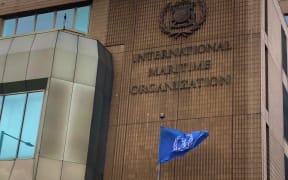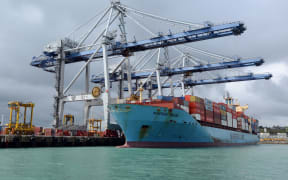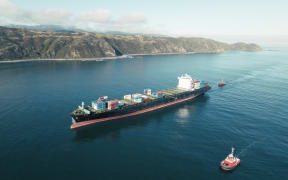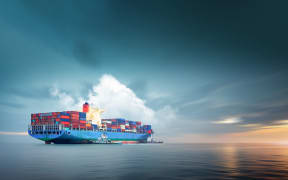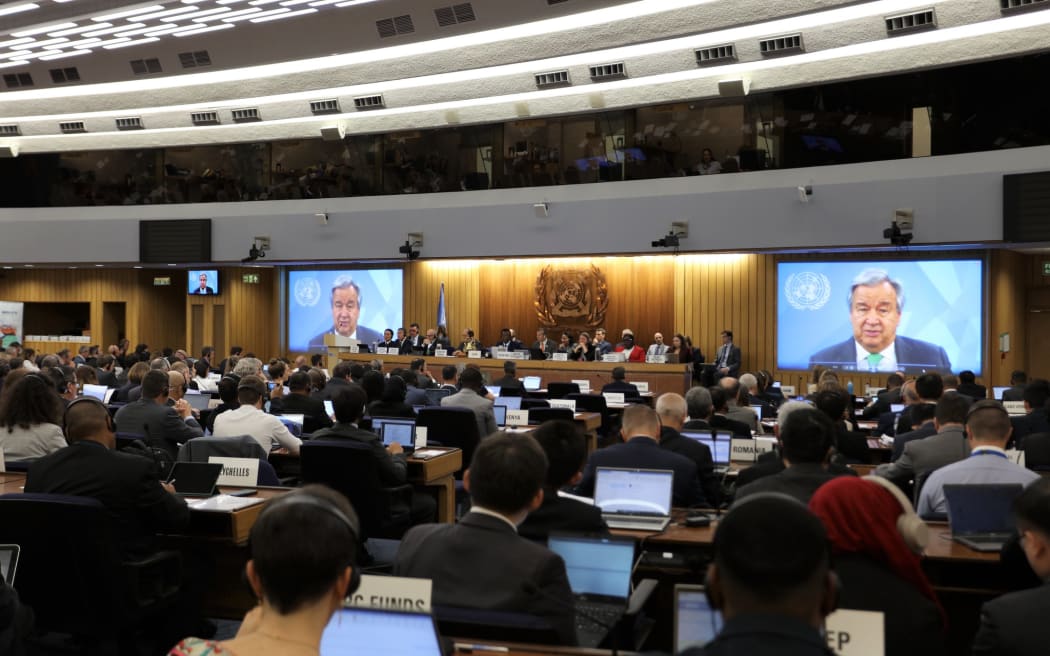
IMO Marine Environment Protection Committee (MEPC80) in London. Photo: IMO
Pacific island nations have sounded the alarm on a possible "disinformation" campaign peddled by a "couple of countries" about their proposal to introduce a carbon levy, as the clock ticks down for the International Maritime Organisation (IMO) to finalise and adopt a strategy to reduce greenhouse gas emission from ships.
Marshall Islands Special Envoy at the UN's regulating arm on global shipping, Albon Ishoda, and Vanuatu's Climate Change Minister, Ralph Regevanu, who are leading the Pacific at the negotiations, said on Tuesday, they have had to "clear up" information about the levy as the IMO climate talks enter crunch time.
"We have had to, in the last couple of days, try and clear up some of what we think is disinformation about the levy, about who is pushing for it," Regenvanu told journalists in London.
"We have been the ones pushing for it right from the beginning, especially the Marshall Islands. We think it is the simplest, most effective, most efficient measure to get us to that 1.5 degrees."
Regenvanu said "the disinformation is disappointing" because it attempts to make the Pacific's levy proposal," an us versus them issue between developed and developing countries".
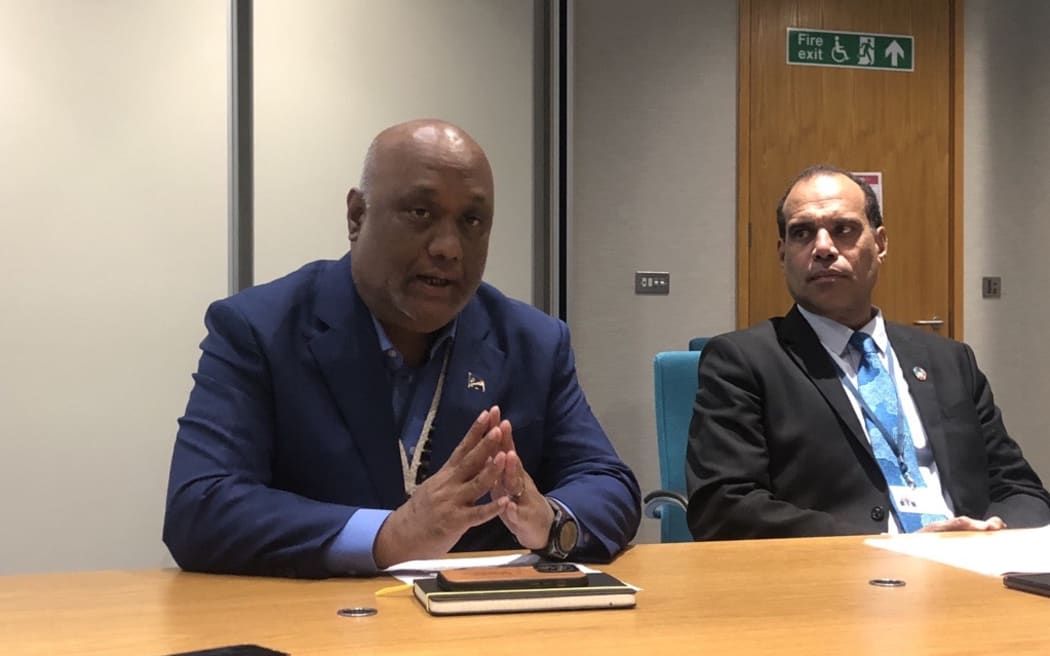
Albon Ishoda, left, and Ralph Regenvanu at the IMO Headquarters in London. 4 July 2023 Photo: RNZ Pacific / Kelvin Anthony
In 2021, the Marshall Islands and Solomons Islands submitted a proposal to the IMO to put a price on shipping pollution at $US100 a tonne of carbon emissions per shipping vessel.
While it was not popular at the time, it has since gained support, being considered by the UN body as an economic measure that could help generate revenue for the shipping sector and support its transition away from fossil fuels.
However, there are now several competing proposals on the table, including from the Japan, Norway, China - the world's largest exporter - and others.
This week, the Financial Times reported China wanted the emissions tax proposal killed because it was "unrealistic" and supported by "developed nations".
Ishoda said claims that the levy "will hurt the developing countries" and is being influenced by developed nations was "not true".
"Unfortunately, there have been a couple [of] countries that have gone around and said that this measure is going to be hurtful," he said.
When RNZ Pacific asked Ishoda who was creating the disinformation, he said: "I am not allowed to say the state's name," but added "there are a couple of states that have come out and say this will be very harmful".
As a result, he said "some of the smaller states across other regions have picked it up and said 'that is the case', without even reviewing our proposal".
"That is why we are trying to have more consultation with other member states, so they understand that this is the truth about the proposals that we have put on the table."
It is understood there will be no carbon levy adopted at this week's Marine Protection Environment Committee (MEPC).
But Ishoda told journalists the proposal for a levy must remain on the table.
"The worst outcome [is ruling it out] because then it actually does not ensure equitable transition for everyone," he said.
"The best outcome is that we decide on a comprehensive impact assessment that reports back to the next MEPC with some agreed measures to take forward."
He said the assessment would need to look into the disproportionate negative impact that a levy could have on the economies of both the developing and developed countries.
As we head into the final stretch of #IMO #MEPC80 meetings, I want to address some #disinformation we’re seeing about two goals we have this week: a) targets for decarbonisation, and b) the levy.
— Ralph Regenvanu (@RRegenvanu) July 4, 2023
A thread:#ClimateActionNow
Cooks Islands don't want levy
But the Cook Islands said on Tuesday that while it fully backed the 1.5 degrees-aligned transition, it did not support "punitive levy" proposals to tax international shipping.
Foreign Affairs and Immigration director of treaties, Sandrina Thondoo, said the "wider developed world" needed to be held accountable for its unequal contribution to the climate crisis.
Developed nations, like the G20, should also fund climate finance to compensate climate vulnerable nations, she said.
"The imposition of an economic measure on shipping, such as the punitive levy currently under consideration here at the IMO, must not come at a cost to the SIDS [Small Islands Developing States]," Thondoo said.
"We must not lose sight of the fact that we are almost totally dependent on ships and shipping to facilitate the import of all essential goods and services to remote island states.
"The food, medicines, building materials that we rely on to sustain our island societies and their cultures - we have limited shipping services available to us."
She said they had to ensure a just and equitable transition that leaves no country behind.
Thondoo said the impact on our fragile economies of the measures, both operational and fiscal, must be assessed, and any disproportionate impacts addressed, before the approval and subsequent adoption of any medium or long term measures to decarbonise the shipping industry.
Call for Australia to be real
Meanwhile, a lead organisation for Pacific climate NGOs wants Australia to make its position clear on whether it supports Pacific nations' proposal to introduce a carbon tax.
Pacific Islands Climate Action Network regional coordinator Lagi Seru said Australia should not be "sitting on the fence" on the issue.
Seru said it should also stop making "vague statements" if it wanted to help its island neighbours who were on the frontline of the climate crisis.
"I am not sure what their position is," Seru said.
"The statement they delivered yesterday was that they were in support of the Pacific; they support the 1.5-degree trajectory, which is good.
"Then they need to come out and say very clearly that they are going to support the Pacific islands governments with the push for a carbon levy," he added.
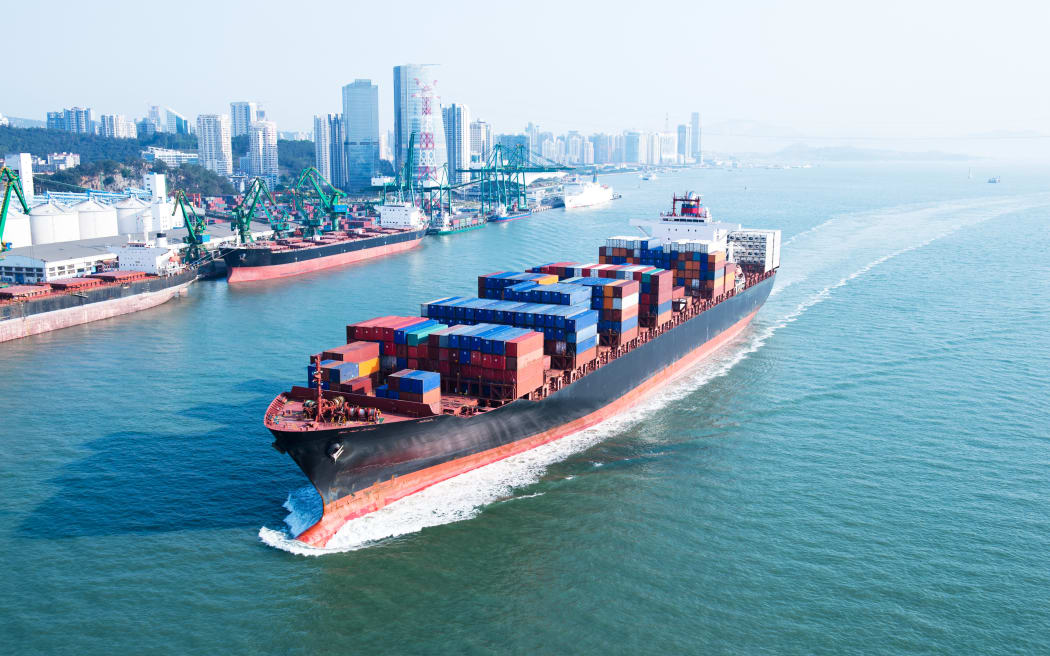
Photo: 123RF
